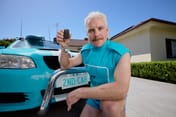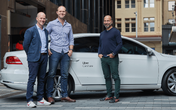
How car sharing helped this entrepreneurial student to quit his day job
For student Zicong Wang, car-sharing is not only fuelling his entrepreneurial spirit, making him money and helping the environment, it’s providing a much-needed solution to Tasmania’s hire car shortage.
When Zicong, 25, arrived in Tasmania from China in October 2019 to study Civil Engineering at the University of Tasmania, he got a part-time job delivering groceries to Asian restaurants to help pay his bills.
However, his entrepreneurial eye soon noticed Tasmania’s acute hire-car shortage – the traditional car hire companies sold off major swathes of their fleet during Covid – and student Zicong had a “lightbulb moment”.
"I saw an advert for Uber Carshare on Facebook and thought it looked like a great business and a low risk to try it out,” he says. “I had two cars at the time – a 2020 MG3 and a sporty 2016 Audi A5 – but I was hardly using the MG so decided to car share and listed it online."
It was immediately booked out every day. There were 11 bookings in the first month, from people visiting Tasmania. I made over $2000 that month, so it was a huge success on the prototype.
As a result, Zicong listed his second car and quickly started making the same amount of money on that car - now just five months later he has been able to give up his job as a delivery driver.
Selecting the right cars for sharing
In March, Zicong sold his two cars in order to buy three more, which he parks in Sandy Bay.
He is averaging around $1500-1800 a month on them, renting them out for $100 a day and/or $20 an hour, taking about 20% off for expenses.
Zicong has worked out that all of the running costs (tyres, fuel, cleaning, servicing) and standing costs (rego, insurance and hire-and-drive premiums to comply with Tasmanian regulations) add up to 17 cents per kilometre - which is more than covered by the per-kilometre rate he gets paid.
"I made some good decisions early on and read the market, and it’s my sole business now,” he says.
"It's a good idea to trial different prices with the cars. You can start by listing your personal car for the same price as the other ones in the area, and see how that goes. Different prices will work for different cars and different locations. Even now, I'm still adjusting the price."
Zicong notes that the peak summer tourist season is likely to dip during Tasmania's chilly winter - car rental is a seasonal business, so it's good to take a long view and not get too caught up in monthly ups and downs.
"The bookings will probably drop in winter, so I might drop the price a bit, but I will see what the market is doing."
Get by with a little help from my friends
Once Zicong’s friends heard how much he was earning, they wanted in on the action. As a result, the student was able to provide his friends with a flexible side-income, employing them to clean the cars.
Now, Zicong and three of his friends are investing a few thousand dollars to buy more cars to launch their own car-sharing company in the new financial year, which they plan to run through Uber Carshare.
“Because I'm on a student visa, I can only work 20 hours a week. This is another reason I wanted to start a company as I can't grow this all by myself,” he says.
“I want to scale the company, start small and see where it goes. Friends are investing in the company too, so while currently all three cars are owned by me, we’re aiming to get 10 cars by the end of year."
Zicong appreciated how easy it was to get started with his car-sharing venture, and the freedom he has to build his business by providing great service to travellers.
“Listing a vehicle on the Uber Carshare app is very easy. The key is to provide excellent service so you get very good reviews and provide yourself a lucrative business for the future.”
“It’s scalable, flexible, not a lot of effort, and unlike other business opportunities, there are not a lot of costs to get set up and give it a go.”
But for me, making money isn't the most important thing. I like the fact that by making these cars available, I can help to keep tourists coming to Tasmania and travelling around the state. It’s good for the other businesses and small towns that rely on tourism. There’s been such a shortage of rental cars that people have had to cancel their holidays to Tasmania, so I see this as also helping the local economy and community.
"With all due respect, the current transport system here is not great, and it can be hard to see the city or get to other parts of the state without a car. I'm aiming to help both local people and tourists get around, explore and get things done by working with the Tasmanian government and Uber Carshare."
Zicong’s top tips
- Trial a few different places to park the cars. In certain suburbs you might find your car is booked more than others, due to convenience and what other public transport is around. Once you find that sweet spot, stay where you are.
- If you have a few hours a week to spare and some extra money, a car sharing business feeds the entrepreneurial spirit and is a super easy, low cost way to get into a side-gig. If you want to grow your business past one or two cars but don’t have a lot of time, get friends involved or perhaps see if there are local students keen to help out on a flexible hourly basis.
- Start small and see where it goes. I’m obviously doing very well out of car sharing due to the shortage of hire cars in Tasmania, but even if you’re just recouping your car’s costs on things like servicing and rego, it’s worth it.
Ready to take the next step towards starting your own car share enterprise? List your first car today.
If you have any questions, our Owner Onboarding team is on hand with personalised tips to set you up for success.









